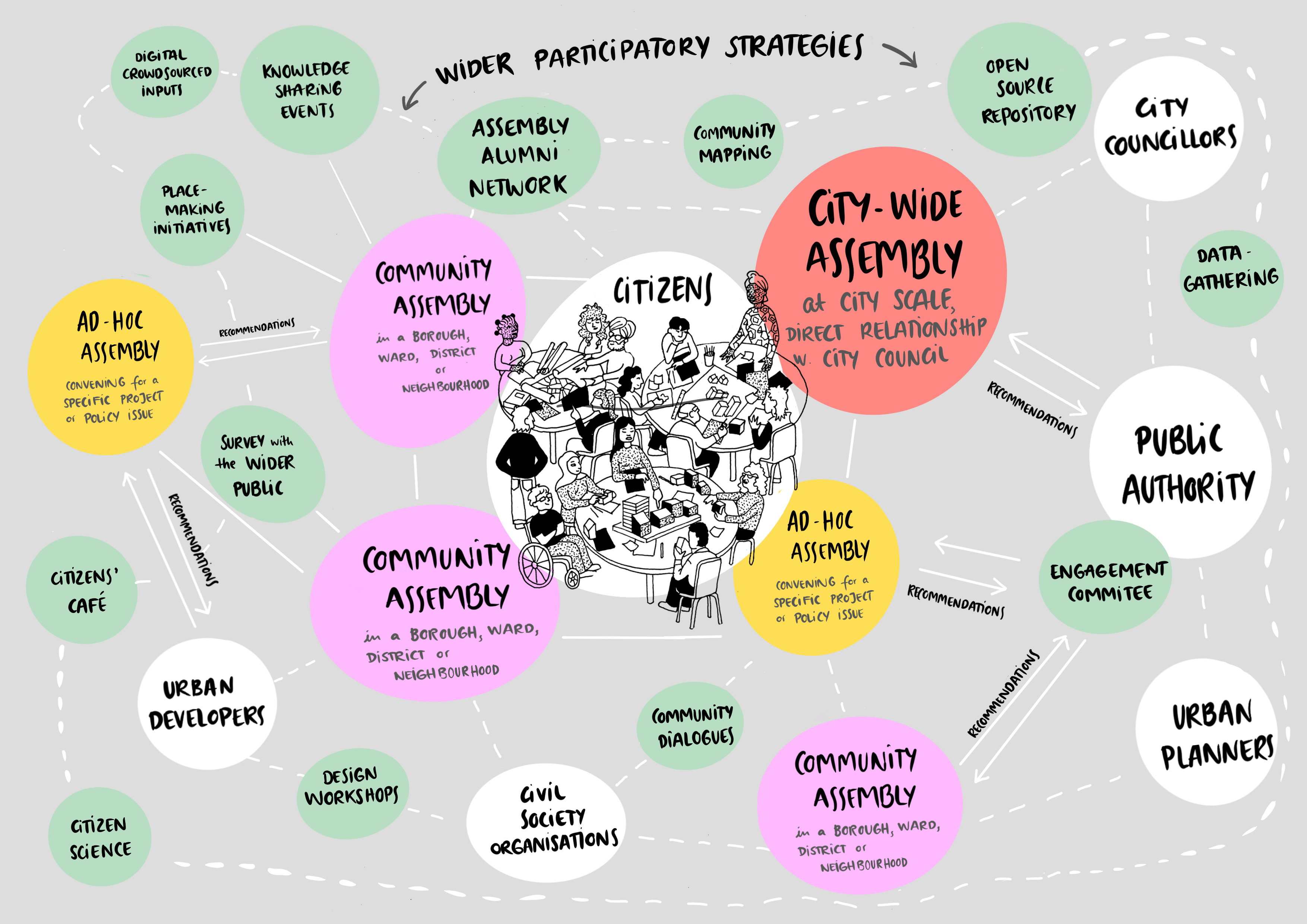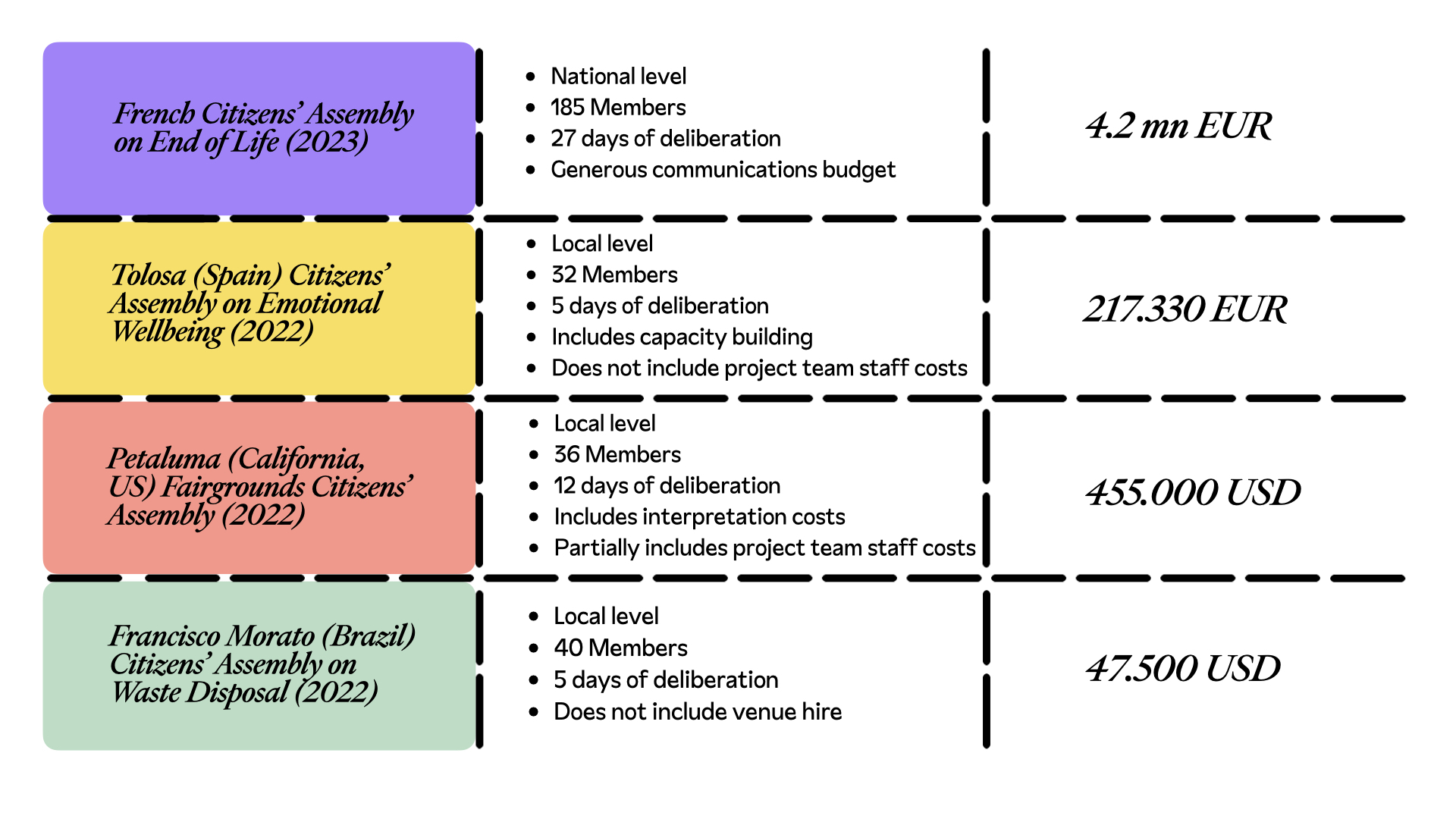We are seeking expressions of interest from cities around the world to work with DemocracyNext to make systemic changes to how decisions about urban planning are made, with deliberative and sortition (lottery)-based approaches such as Citizens’ Assemblies as a key pillar of change. The ultimate goal is to help cities be able to make fair decisions that garner legitimacy about the future of our cities related to urban planning issues such as housing, transportation, mobility, environmental impacts, and others.
Using the proposals outlined in DemocracyNext’s paper Six ways to democratise city planning as a starting point, the goal is to collaborate with 3 cities over the next 2 years to adapt the proposals to each context, designing how Citizens’ Assemblies can be embedded in each unique place to broaden and deepen citizen participation and deliberation in urban planning decision-making.
Click here to fill out the application form
DemocracyNext has secured funding for the next 2 years from the National Endowment for Democracy to carry out this work with 2 cities in Global Majority countries. This includes the ability to ‘sub-grant’ a portion of the funding to support the cost of a local delivery organisation to deliver the Citizens’ Assembly (and/or venue or other core costs) for the two cities.
Proposal launch event:
13 February - (8:00-9:30 PST, 11:00-12:30 EST, 17:00-18:30 CET) or
14 February - (9:30-11:00 CET, 13:30-15:00 IST, 19:30-21:00 AEDT)
‘DemNext Office hours’ - General information about Citizens’ Assemblies:
19 February - (17:00-18:00 CET, 8:00-9:00 PST, 11:00-12:00 EST) or
20 February - (10:30-11:30 CET, 14:30-15:30 IST, 20:30-21:30 AEDT)
Information call for cities interested in applying to partner with DemNext:
21 February - (10:00-11:00 CET, 14:00-15:00 IST, 20:00-21:00 AEDT) or
21 February - (9:00-10:00 EST, 15:00-14:00 CET, 19:00-20:00 IS)
Further details and all relevant information can be found below.
We are DemocracyNext, an international, non-profit and non-partisan research and action institute. We believe in a more just, joyful, and collaborative future, where everyone has meaningful power to shape their societies. Our mission is to shift who has power and how we take decisions in government and in institutions of daily life including schools, workplaces, museums, banks and others.
We work to enable more people to see the potential of sortition (selecting decision makers by lottery), deliberation, and participation as transformative democratic principles; to enable the creation of more deliberative spaces - such as Citizens’ Assemblies - in which we can be with complexity, channel our collective wisdom, and find common ground; and to explore how these principles transform leadership.
Our work to innovate democratic governance is anchored in a holistic, systemic worldview, which seeks to nurture our relationships with one another as well as with the living world.
As the global urban population is set to more than double by 2050, with nearly seven in 10 of people living in urban areas, cities, and how decisions are made about their future, presents a huge opportunity to consider how we foster democratic innovation and empower people to shape the places they call home.
We recognise that local governments and other key actors in shaping the built environment are finding it difficult to tackle some of the most pressing and complex challenges facing cities today. Around the world, urban areas are facing similar issues related to housing affordability, the widening gap of social and economic inequality, vulnerability to climate change, population increase, rapid urbanisation, and mobility challenges. These challenges are pressing and complex, and will require the collective agency and intelligence of everybody to find better, more inclusive, paths forward. We see a huge opportunity to re-consider how people living in urban areas can be empowered to shape the places they call home.
For this reason, we convened an International Task Force on Democratising City Planning in recognition of these problems, with a desire to propose systemic changes for addressing them. With the Task Force, we learned from numerous inspiring examples of participatory and deliberative processes around the globe. We then considered and explored how the system could change to make meaningful and informed public deliberation and participation, such as Citizens’ Assemblies, the norm in urban planning decision making.
At the heart of this proposal are three types of Citizens’ Assemblies with rotating Members selected by lottery (sortition) - city-wide, community, and ad-hoc. These representative and deliberative Assemblies are envisioned to be a core part of a much wider participatory ecosystem that involves digital surveying, participatory data collection and map-making, citizen science, and community-driven initiatives like placemaking, public dialogues, and design workshops.

We have thought about Citizens’ Assemblies holistically, as an intrinsic part of a city’s decision-making processes. This means there should be a direct connection to the relevant public authority and other key actors, including managers, urban planners, developers and investors, civil society groups, architects, and researchers.
To read the proposal, please click here
We're seeking partners that are motivated and have the capacity to collaborate with DemocracyNext to design and implement a Citizens’ Assembly on a specific, relevant topic over the next 2 years. In our proposal we identified some possible ‘entry points’ or ‘scenarios’ which are listed below’. This is not exhaustive but rather a range of possible starting points:
We are seeking applications from cities around the world who are interested in piloting the ideas outlined in DemocracyNext’s proposal, Six ways to democratise city planning: Enabling thriving and healthy cities. The basis for this collaboration is to implement a new model for citizen engagement that is guided by the models outlined in the proposal.
The intention is to work with a cohort of 3 cities to contextualise and implement how Citizens’ Assemblies can be used systematically to broaden and deepen citizen participation in urban planning decision-making processes. This will require tapping into the knowledge and expertise of each particular city in order to adapt these general proposals. This means that the approach will be different in each place, as the logical entry point and the available resources for initiating a Citizens’ Assembly will differ in each city.
DemocracyNext brings a wealth of knowledge and experience in designing Citizens’ Assemblies and connections to an extensive network of international experts in the field of Deliberative Democracy. DemNext’s founder and CEO, Claudia Chwalisz, was involved in designing the world’s first permanent Citizens’ Assemblies in Paris, Ostbelgien, and Brussels (on climate). With DemNext’s Founding Head of Research and Learning, Ieva Česnulaitytė, she has also co-authored the OECD’s flagship report Innovative Citizen Participation and New Democratic Institutions: Catching the Deliberative Wave and led the development of the OECD Good Practice Principles for Deliberative Processes. Claudia oversaw the development of the OECD Evaluation Guidelines for Representative Deliberative Processes (2021) and wrote the OECD paper on Eight Ways to Institutionalise Deliberative Democracy (2021). She also set up and co-ordinated the global OECD Innovative Citizen Participation Network.
James Macdonald-Nelson, the Project Lead for Urban Design and Planning at DemocracyNext, a designer with degrees in landscape architecture, urbanism, and global development studies. Having studied and worked in spatial practice for 10 years in Toronto and then Berlin, mostly delivering large-scale commercial and residential development projects James has a deep knowledge of how the built environment is transformed, how decisions are made about our cities - and how often citizens are left out of these processes.
The application is intended for representatives from a mayor's office, senior planners and heads of planning departments, managers in a municipal engagement department, or city manager in general. The application must be made in partnership with an allied civil society organisation, and can include a developer.
We are also interested in hearing from motivated urban developers, civil society organisations, or heads of neighbourhood associations/community boards who are interested in implementing these ideas. In these cases though, it’s important to emphasise that political and administrative buy-in in the local municipality is fundamental to forming a collaboration with DemocracyNext.
Absolutely! For cities that are not selected to be part of the first cohort in 2024, but who would like to stay updated and wish to learn from the experiences of the first cohort, it will be possible to do so. Progress will be shared regularly with cities who wish to stay informed via a newsletter and occasional learning calls to share what has been developed so far. There will also be opportunities to partner with us in the future to expand this work.
DemocracyNext has secured funding for the next 2 years from the National Endowment for Democracy to carry out this work with 2 cities in Global Majority countries. This includes the ability to ‘sub-grant’ a portion of our funding to support the cost of a local delivery organisation to deliver the Citizens’ Assembly (and/or venue or other core costs) for the two cities. These funds would be paid directly to the local operator or would cover costs directly. However, we still expect a minimum financial contribution from the municipality in order to ensure that the process is fully supported by the partner city. However, we recognize this amount will vary depending on the context, the size of the city, and the scale of the Assembly.
The third city will need to indicate that they have the initial resources to carry out this collaboration, or that they are willing to apply for or seek funding with DemocracyNext.
To give an idea of how much to budget for an Citizens’ Assembly we have included below the typical costs.

Drop in for a group Q&A session with our DemocracyNext team members to ask any general questions you may have about Citizens’ Assemblies. Be sure to also check out our Assembling an Assembly Guide - a step by step guide that walks you through the process of implementing a Citizens’ Assembly from start to finish. You can register here:
19 February (17:00-18:00 CET, 8:00-9:00 PST, 11:00-12:00 EST)
20 February (10:30-11:30 CET, 14:30-15:30 IST, 20:30-21:30 AEDT)
We will host a targeted call with interested cities to answer any further practical questions about the application process and how a collaboration with DemocracyNext would work. We will host two calls to accommodate different time zones. You can register here:
21 February - (10:00-11:00 CET, 14:00-15:00 IST, 20:00-21:00 AEDT) or
21 February - (9:00-10:00 EST, 15:00-14:00 CET, 19:00-20:00 IS)
Deadline to submit initial expression of interest to partner with DemocracyNext.
Please fill out this application form by the end of the day on 12 March. **Questions found in the application form can be found below so applicants can prepare in advance**
Cities that are not shortlisted will be invited to become part of a learning group to follow progress.
During the week of March 25h, DemocracyNext will hold interviews with potential partner cities.
DemocracyNext will be available for one-on-one calls with cities to answer any questions.
Details of what is expected in the full application will be communicated to selected shortlisted cities.
This is an estimated timeline which has some flexibility to adapt to each city's policy making/project development cycles.
To help cities prepare to submit an Expression of Interest, the application questions are listed below. You can access the online application here.
Please answer the questions below to show your interest. If selected, you’ll be asked to fill in the full application. You can find the preliminary list of questions for the full application below.
Note: even if you don’t have experience with deliberative engagement, or will require help to get political buy-in to run such a process, or if applicants would need to secure the necessary resources, please don’t hesitate to apply. If you feel that there is a meaningful opportunity in your city to pilot Citizens’ Assemblies in urban planning, we’d like to hear from you!
Context:
Partnerships:
Resources:
Existing competences:
Commitment and timing:
Systemic change: